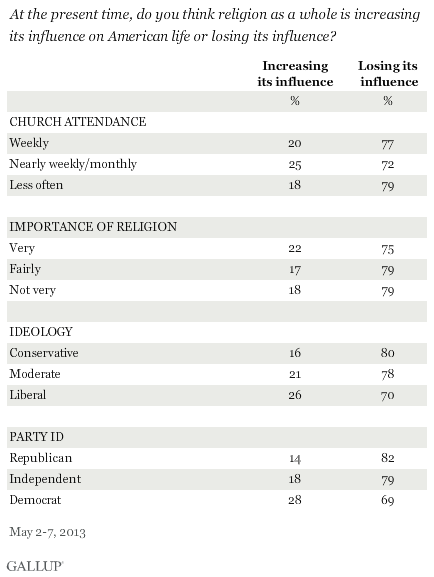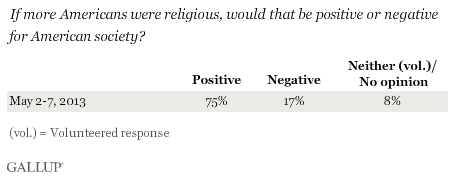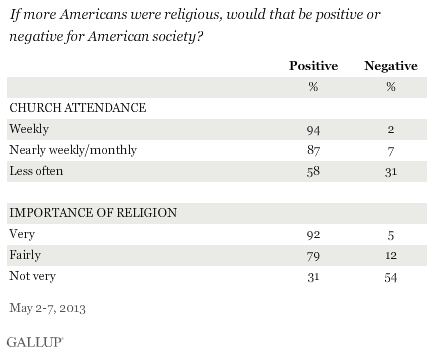These represent Americans' most negative evaluations of the impact of religion since 1970, although similar to the views measured in recent years.

Americans over the years have generally been more likely to say religion is losing rather than increasing its influence in American life.
In addition to the previous peak in views that religion was losing its influence measured in 1969 and 1970, at least 60% of Americans thought religion was losing its influence in 1991-1994, in 1997 and 1999, in 2003, and from 2007 to the present.
Americans were more likely to say religion was increasing rather than decreasing its influence when the question was first asked in 1957, in 1962, at a few points in the 1980s during the Reagan administration, after the 9/11 terrorist attacks in late 2001 and early 2002, and in 2005. The high point for Americans' belief that religion is increasing its influence, 71%, came in December 2001.
These perceptions of religion's influence in American society are not related to Americans' personal
religiosity, as measured by church attendance or the self-reported importance of religion in one's life.
In general, highly religious Americans are neither more nor less likely to say religion is losing its influence than those who are not religious.
There is, however, a modest relationship between Americans' ideology as well as partisanship and their views of the influence of religion, with liberals and Democrats more likely than conservatives and Republicans to say religion's influence is increasing in American society.

Most Americans Also Say U.S. Would Be Better Off if More Americans Were Religious
A separate question found much more positive views of the potential for religion to have an impact on the country, with 75% of Americans saying they think it would be positive for American society if more Americans were religious.

Americans who attend church regularly and who say religion is important in their own lives are far more likely than others to say it would be positive for American society if more Americans were religious.
Even so, over half of those who seldom or never attend and close to one in three Americans who say religion is not important to them personally still say it would be positive for society if more Americans were religious.

Implications
The view most Americans hold -- that religion is losing its influence on American life -- does not appear to reflect personal religiousness, but rather appears to reflect widely shared judgments on factors relating to the course of events in the U.S.
In 1969 and 1970, with the Vietnam War raging in controversial fashion and with the cultural and sexual revolutions underway, and to a lesser degree at times in the 1990s, Americans held negative views similar to those they hold today.
The degree to which these views changed during the Reagan years, and after 9/11, suggest that they could change again in the years ahead.
The fact that most Americans think the country would be better off if more Americans were religious shows that many of those who believe religion is losing its influence may think this is a negative state of affairs.



















